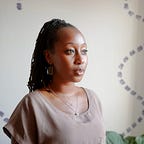Connecting Perspectives: 30 Nigerian Girls Drowned and Libya is Selling Africans as Slaves
Are we sick
or are we healthy?
Are we sick
or are we healthy?
Sometimes we can not see past colonial fantasies
Sometimes we cannot see ourselves
Sometimes we cannot see.
I’ll ask again:
Are we sick
or are we healthy?
Black bodies have been drowning in oceans and seas for centuries.
Trying to get to where I am, or in some cases trying to escape where I am.
The frontier feeling like skin
The borders like violence against my force
against my kin
Sometimes the drowning seems better than the journey
Sometimes the drowning feels like peace
The sea is both peace and death
But maybe they are not so different
Are we sick?
I’m asking: are we sick?
or maybe it’s just capitalism.
Choking on salt water
Salt wounds
Remember India: salt resistance
Salt water is healing
It is also violent
Are we sick or are we healthy?
I’m wondering.
What kind of diseases have we brought on ourselves.
A few years ago I was disappointed at how quickly #BringBackOurGirls faded out, despite most of the 276 girls having not been found. Still, I am continually amazed at how invisibilized certain vital stories, the recognition of human dignity, are in the way we consume media. The geography of diaspora narratives, transnational conversations, and decentralizing the Western perspective is a consistent and important struggle — not divorced from mental/emotional decolonization and creating global equity. We need to share information, resources, and experiences in a way that reflect the world many of us are working so hard to create.
Thirty Nigerian girls between the ages of 14–18 drowned in the Mediterranean Sea as they were being brought to Europe for sex trafficking. About 50 more Nigerian girls are missing. Italian authorities believe these girls were put on dinghie boats from Libya heading to Europe. From Libya where they are currently selling African migrants as slaves. These migrants are mainly from West African countries like Nigeria, Senegal, and Gambia but also from other African countries like Eritrea, Somalia and Sudan. Nigerian, Eritrean, Somalian, and Sudanese migrants are among the most at-risk African migrants and the Libyan Slave trade and European sex trafficking exploits this. Historically the Arab world (North African and Gulf countries) has been integral and working in tandem with European countries in the Black African transnational slave trade. We are reminded that history is happening now.
It is no surprise or coincidence that these Nigerian girls and women who drowned in the Mediterranean Sea, trying to get to where many of us are, were coming from Libya; a country where many African migrants travel to hoping to take a boat across the sea to Europe. Libya has been in a constant state of violent turmoil since 2011 when — in the city of Benghazi — security forces opened fire on a crowd of protestors. Libya’s violence towards and disregard for the lives of Sub-Saharan (Black) Africans is horrific — though not substantially removed from the global anti-Blackness and African-xenophobia permeating and endemic to Western societies historically and currently. The contempt for human life that those in power in Libya are displaying shows how degraded and desensitized our societies have become.
In Europe today, especially central Europe, Nigerian girls are among the most sex trafficked women and Black Africans experience the most police harassment and brutality. In this way Libya is acting as a base for and conduit through which the continued exploitation and devaluation of Black African bodies happens in the so-called First World. Black Lives Matter is relevant everywhere globally and Libya is an indication that while to some “Black Lives Matter” should be redundant, it is not. Transnational (Black) solidarity and activism is not a luxury, it is a necessity if this global system that feeds on inequity, fear and racism is to be eradicated.
If we cannot see each other. If we cannot feel the pain and injustice of the other. If we cannot see the world from different angles. If we cannot tell the other stories, if we cannot uplift the other narratives. If we cannot… then we will continually be appalled by the state of the world, sharing stories and hashtags on Facebook without following it with action, with insistence on and support for beautiful alternatives to current realities.
Violence is a pathology so we need to find another path. Borders are political constructs so we need to construct a new perspective. This economic system does not work for the majority of people, so the majority of people need to find a system that works for us. All of what Libya is doing: letting young girls drown in the sea, selling Black bodies, silencing those who resist — is not Libya alone. It is all of us in the world: watching. We are either complicit in global oppression or explicit in global restructuring. Resist. Resist. Resist. Gain new perspectives. Resist. Drink water.
